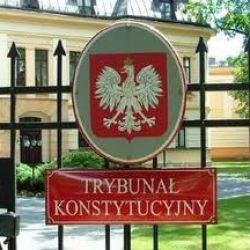United Nations Special Rapporteur on the Independence of Judges and Lawyers, Diego García-Sayán, presented his preliminary observations on Friday 27 October, following his visit to Poland, upon invitation by the Polish government.
The Special Rapporteur was firm in his observations recalling that “any reform of the judicial system should aim at improving its effectiveness, not at undermining its independence and legitimacy”, adding “the independence of the judiciary and the separation of powers must constitute the guiding principles of any such reform.”
Florian Irminger, Head of Advocacy at Human Rights House Foundation (HRHF). commented: “Poland’s government quickly followed the path of Hungary on taking measures undermining the institutions of a well-functioning democracy, making its democracy ill.”
Since November 2015, Poland has been going through a “constitutional crisis”. This began with changes to the functioning of the Constitutional Tribunal, a law granting government control over public TV and radio, and a law granting additional powers of surveillance and posing political interference in the judiciary environment.
Acknowledging the seriousness of the crisis, the Special Rapporteur commented on the legislative acts taking by the government related to the reform of the judiciary “taken together, these legislative acts pose a serious threat to the independence of the Polish judiciary and the separation of powers.”
The Special Rapporteur also recalled the different issues threatening the independence of the judiciary in Poland: “The Constitutional Tribunal is the first victim of the reform,” he said. “The tribunal is still in place, but its independence and legitimacy have been seriously undermined”.
The “act on the common Court organization”, allowing the Minister of Justice to dismiss presidents of the courts and appoint a new president of his choice, “raises serious concerns in relation to the principles of independence of the judiciary and separation of powers” followed the Special rapporteur.
He also raised his concern at the recent amendments to the Act on the Prosecution Service, which merge the positions of the Minister of Justice and Prosecutor General and attribute new powers to the latter.
Mentioning the draft law on the Supreme Court, he stated, “the very fact that the text of such an important law is being discussed behind closed doors is a source of serious concern.“ Moreover, “a number of provisions continue to pose serious threats to the independence of the judiciary and the separation of powers principle.”
The special rapporteur concluded “the way out of this critical moment is to promote a fair, open and transparent process involving not only the parliamentary majority and the opposition but also the judiciary, the Office of the Ombudsman and civil society actors.”
“The Special Rapporteur’s findings echo the concerns expressed by international institutions and civil society organisations about threats to the rule of law in Poland for some time for the last two years,” commented Florian Irminger “It is high time for Poland’s government to understand that all these voices do not add up to harm Poland and instead listen to these voices aiming at protecting Poland’s democratic institutions.”
UN Special Rapporteur on the Independence of Judges and Lawyers visit to Poland
The Special Rapporteur, Diego García-Sayánvisit, visited Poland 23-27 October to assess the impact of the constitutional crisis on the composition and functioning of the country’s constitutional tribunal and the implications of the Government’s extensive reform of the judicial system.
International concern on developments in Poland
The Council of Europe’s Secretary General also criticized the government’s attempts to undermine the Supreme Court. On 25-26 October a delegation of the Venice Commission was in Warsaw to prepare an opinion that should be presented early December 2017 on the merging of the functions of the Justice Minister and the formerly independent Prosecutor General.
Recently the Parliamentary Assembly of the Council of Europe (PACE) adopted a resolution on threats to the rule of law focusing on five countries including Poland.
At the United Nations, concerns have been raised during Poland’s periodic human rights review as well as by the UN Human Rights Committee last year.





